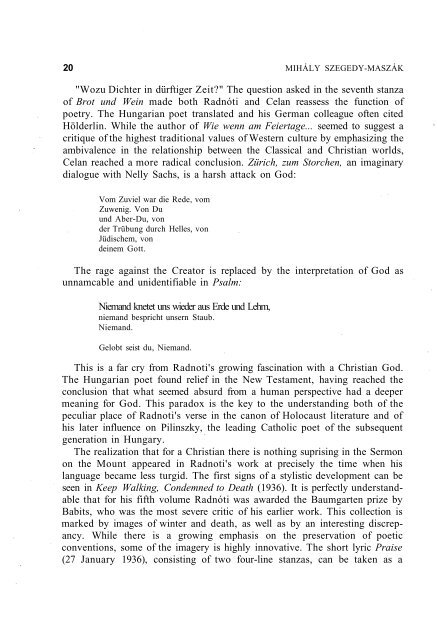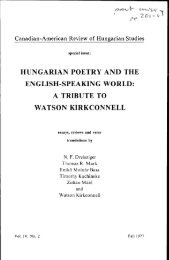HUNGARIAN STUDIES 11. No. 1. Nemzetközi Magyar ... - EPA
HUNGARIAN STUDIES 11. No. 1. Nemzetközi Magyar ... - EPA
HUNGARIAN STUDIES 11. No. 1. Nemzetközi Magyar ... - EPA
- No tags were found...
Create successful ePaper yourself
Turn your PDF publications into a flip-book with our unique Google optimized e-Paper software.
20 MIHÁLY SZEGEDY-MASZÁK"Wozu Dichter in dürftiger Zeit?" The question asked in the seventh stanzaof Brot und Wein made both Radnóti and Celan reassess the function ofpoetry. The Hungarian poet translated and his German colleague often citedHölderlin. While the author of Wie wenn am Feiertage... seemed to suggest acritique of the highest traditional values of Western culture by emphasizing theambivalence in the relationship between the Classical and Christian worlds,Celan reached a more radical conclusion. Zürich, zum Storchen, an imaginarydialogue with Nelly Sachs, is a harsh attack on God:Vom Zuviel war die Rede, vomZuwenig. Von Duund Aber-Du, vonder Trübung durch Helles, vonJüdischem, vondeinem Gott.The rage against the Creator is replaced by the interpretation of God asunnamcable and unidentifiable in Psalm:Niemand knetet uns wieder aus Erde und Lehm,niemand bespricht unsern Staub.Niemand.Gelobt seist du, Niemand.This is a far cry from Radnoti's growing fascination with a Christian God.The Hungarian poet found relief in the New Testament, having reached theconclusion that what seemed absurd from a human perspective had a deepermeaning for God. This paradox is the key to the understanding both of thepeculiar place of Radnoti's verse in the canon of Holocaust literature and ofhis later influence on Pilinszky, the leading Catholic poet of the subsequentgeneration in Hungary.The realization that for a Christian there is nothing suprising in the Sermonon the Mount appeared in Radnoti's work at precisely the time when hislanguage became less turgid. The first signs of a stylistic development can beseen in Keep Walking, Condemned to Death (1936). It is perfectly understandablethat for his fifth volume Radnóti was awarded the Baumgarten prize byBabits, who was the most severe critic of his earlier work. This collection ismarked by images of winter and death, as well as by an interesting discrepancy.While there is a growing emphasis on the preservation of poeticconventions, some of the imagery is highly innovative. The short lyric Praise(27 January 1936), consisting of two four-line stanzas, can be taken as a
















